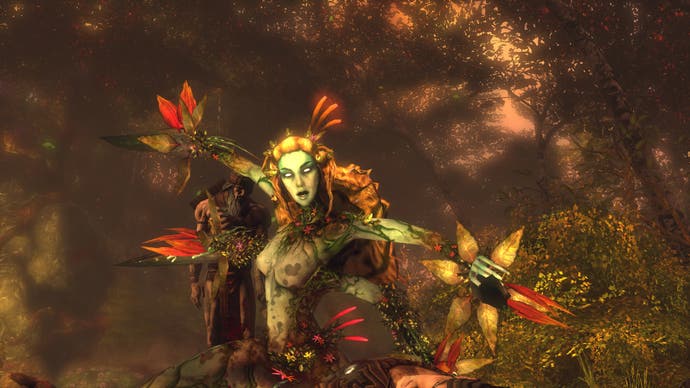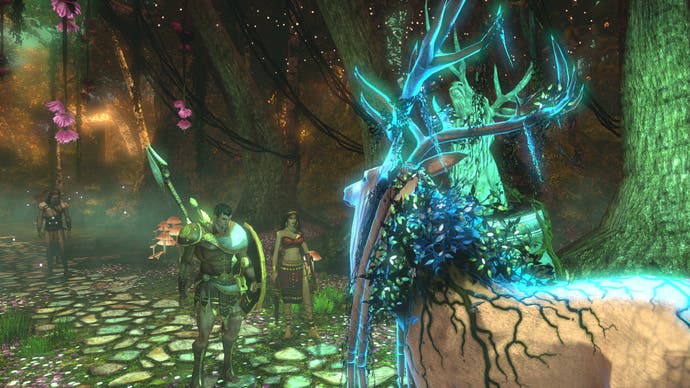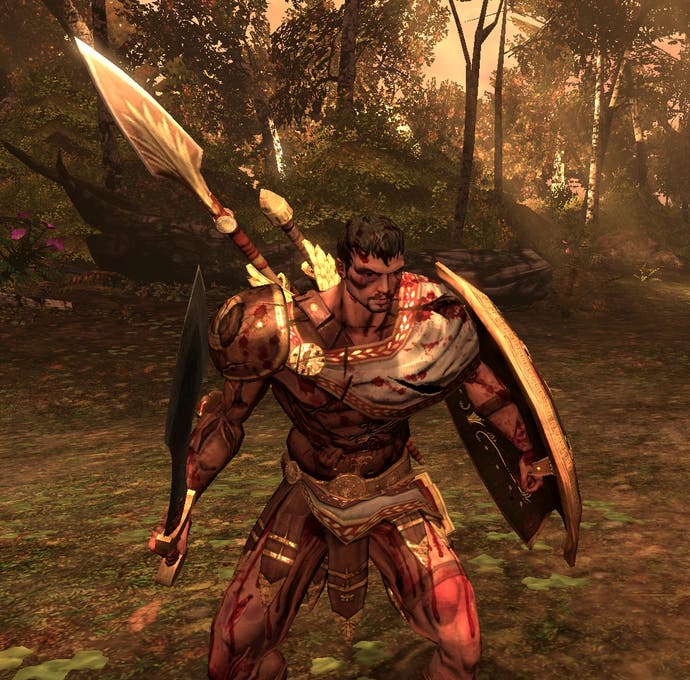Rise of the Argonauts
Liquid Entertainment on redefining role-play.
As Jason searches the world for the Golden Fleece, he will travel from island to island in any order he pleases; gathering Argonauts, increasing his favour with the gods, and acquiring information that draws him ever-closer to finding Colchis - the ancient isle where the Fleece is hidden. While each of these offers their own unique experiences, each island also "speaks" to the others - helping to create a consistent, living world.
Not only can Jason choose where to go at any given time, there are also many reasons to revisit places he has already been. Completing the initial objective on one will change that island's state, enabling new events and non-player characters to appear. In addition to new Argonauts, equipment, and favour progression, Jason will also walk away from each island with new abilities that will in turn unlock events and side-quests elsewhere in the game.
As such, rather than it merely being a matter of going ABCD or DBAC through the islands, there is a constant reason for you to revisit them, creating an interconnected web rather than just a branching (but otherwise linear) path.

When we sat down to make Rise of the Argonauts, our goal was to make a series of systems that exist to reward the player's choices in cool and unique ways, while removing a lot of the minutiae that can often bog down games in this genre.
As mentioned earlier, Jason's progression and character development is centered on his favour with his four patron deities: Athena, Ares, Hermes, and Apollo. While just about anything the player does in the game can affect his favour with one of the gods, the primary means are through Deeds and Narrative Choices.
Deeds are our means of cataloguing the player's epic trek through mythological Greece. Any meaningful action within the world can trigger a Deed. Killing 20 Dryads, discovering the cave where Zeus was hidden from Cronos, saving hunters from certain death, or successfully outwitting or intimidating an NPC are all some examples of Deeds the player could acquire.
When players come across a temple, they can dedicate their Deeds to one of their patron gods, proclaiming that they performed it in question in their honour, thus increasing esteem with the god in question. Each god holds dominion over a certain set of powers and abilities that reinforce specific domains and play styles. Thus, as Deeds are dedicated to a given god, Jason will be able to select from a wide assortment of powers and abilities appropriate to each one.
The other way to gain favour with the Gods is through narrative choices. Dialogue in most games requires players to choose from a list of options that generally include a right choice (maximum reward), an evil choice (tempting, but often just "gets you in trouble"), and a filler choice (which splits the difference). We contend that this is a false choice, where the player is merely attempting to decipher the intonation and intent of each of the lines before picking the right one. As such, the player isn't really making a decision about what kind of character they are or how they want to handle a situation, they're just trying to get into the designer's head and figure out what answer they wanted them to pick.
In Rise of the Argonauts, the gods are always watching Jason's actions - even in dialogue. As such, when you enter a conversation, each of your choices is represented with an icon reflecting one of the patron gods - each of which infers a tone for the line in question. An aggressive or confrontational choice will please Ares, causing your Favour with him to increase, whereas a cunning or manipulative choice would please Hermes, and so on. As such, every narrative choice that the player makes will level-up their character. This is something very unique to our game and to role-playing games, and it very quickly reinforces our primary goal - make every choice meaningful.

As Jason progresses through his journey, he will accumulate a wide array of Argonauts - some who fight alongside him (Hercules, Atalanta, etc.) and others who perform various gameplay functions on the ship (Daedelus for equipment customization, Medea for mystic guidance, etc.). All of these Argonauts will gather on board the Argo - Jason's massive, mobile headquarters, which grows and develops as the player does.
In combat, each Argonaut has a vast assortment of unique and interesting behaviours, ranging from independent "solo" moves to others that set-up the player for potent combo attacks.
Rather than bog the player down with complex AI behaviour commands, we have kept Argonaut control simple and reliable with proximity-driven AI. If left alone, an Argonaut will wreak havoc all by themselves. If you want to collaborate with an Argonaut, merely move closer to them and their AI will trigger more set-up manoeuvres.
For example, Hercules is our hand-to-hand, brute force Argonaut. Leave Hercules alone and he's perfectly content sending enemies flying and ripping apart anyone he can gets his hands on. But if Jason chooses to fight alongside Hercules, he becomes more of a grappler, setting up Jason by holding enemies in place so that can be executed with ease. By making the choice implicit rather than explicit, we reduce the commands that the player has to learn and ultimately give them more control with less hassle.
From a narrative perspective, each Argonaut is a developed character with a unique history, motives and goals. Thus, even as they help Jason, so too can Jason help them with their own objectives along the way. These help to further develop each character's individual narrative, and unlock new abilities and equipment for each of the Argonauts as the game progresses.

As mentioned earlier, your favour with the Gods is our primary character progression system. By dedicating Deeds to honour the Gods, or by acting in a fashion that pleases them throughout the game, Jason will get new powers and abilities that reflect the natures of the gods he honours.
An interesting twist to this is that favour isn't just represented in a menu screen. Since the gods are pervasive throughout the world, Jason's favour will manifest in changes in his environment. As you walk down a corridor lined with torches, a brazier's flames will burst to life or subside to a flicker, depending on your favour with Ares.
The atmosphere that we are seeking to create is one where the player truly feels that the gods are always watching, and every action he performs will impact their favour in some way, which in turn has a distinct impact on the player's progression through the game as a whole.
It's still a bit early for us to discuss our multiplayer plans. We'll get to that when later on when the time comes.
Again, one of those questions where it is too early to discuss. Obviously, as with any game we'd love to be able to have a Rise of the Argonauts demo, but we just need to make sure it works in our schedule.
Rise of the Argonauts is planned to ship in 2008 for the PlayStation 3, Xbox 360 and PC.

